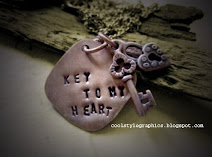In this tutorial I want to detail how to create text along a path in an interesting way and apply it to a common application. Although the circular logo has been used forever, it can still be effective if done well, while mixing in some modern design. In this case, we are going to use some vector art, then grunge it up. This will give it that worn beach look I’m going for. I hope you enjoy it, here we go…
Step 1
Open up Illustrator and create a new document. Grab the ellipse tool. Draw out a new circle while holding down shift to maintain the proportions. Fill the circle with a light blue, I used #A1BEE4. Set the stroke to none.

Step 2
With the circle you just drew selected, hit ‘ctrl + c’ to copy it and ‘ctrl + f’ to paste it in place in front. Now resize it down while holding ’shift + alt’ to scale it proportional in place. Change the fill color to a nice brown, I used #766352. Keep the stroke at none.

Step 3
Next up, I went in search for some free vector palm trees for our logo. I found some nice ones at vector4free, you can download them here. Place them in your Illustrator document. Size the trees and birds and place them in the logo using the image below as a reference. Change the fill color to the same light blue you used before. I also ungrouped them by selecting Object->Ungroup. Then I moved one of the birds up and to the right. I just thought it looked better there ![]()


Step 4
Now we are going to start work on the text of the logo. We’ll need a path to work with, so select the inner brown circle and click ‘ctrl + c’ then ‘ctrl + f’ to paste a new copy in place, in front of the old one. In the tool bar on the left, click and hold the text tool to reveal all the options within that block. Select the ‘Type on a Path Tool.’ Now change your font settings to the same brown color, Trajan Pro for the font, and 45 for the Font Size, set the text alignment to center. Lastly, open up your Character palette. If it’s not already open, then click Window->Type->Character. Change the Tracking to 50, the Vertical Scale to 90% and the Baseline Shift to 10pt. All these settings are suggestions for those who are following along, they may vary for you, if you’ve sized things differently. So use trial and error until things look just right.



Step 5
You should still have the ‘Type on a Path Tool’ selected, now click on the top of the circle you copied and pasted in the previous step. This will send your cursor to the bottom of the circle, because you’re working on type on a closed path (a circle) and this is the center point. No problem, will fix this in the next step. Type in your words, in this case, “Blue Palms.”


Step 6
Now we need to rotate that text along the path and into the correct spot. To do so, grab the direct selection tool, and hover over the text at the bottom where the blue vertical line is (it’s circled in the image below). When your cursor is over that line, you’ll notice that your cursor changes to an arrow with a small upside down ‘T’ next to it. When you get that cursor, click and drag your text to rotate it along the confines of the path. Place it evenly at the top. If you used different settings, you may have to adjust some of the character attributes to get it to sit properly.


Step 7
We add the text “Beach Resort” in much the same manner. This time copy and paste the bigger blue circle in front of itself, we will use this as our path. Change the character settings to 200 for the Tracking, 12 for the Baseline Shift, and 43pt for the Font Size. With the “Type Along a Path” tool selected, click at the top of your newly pasted circle. Type in your text. Now click Type->Type on a Path->Type on a Path Options. Check preview and flip, you will see the text flip over it’s path right away. There are some other interesting options in this window that are worth learning about, but this will suffice for our logo.

Step 8
Grab the ellipse tool and with the same brown color you used previously, draw two small circles between the words on each side. Use the align options to align the circles.

Step 9
In the last steps we are going to add our grunge. Select everything and choose Object->Group to group our entire logo together. Now find a texture that you want to use as an transparency mask. Below is the one that I used, which you are welcome to use as well. It’s modified from a texture I found at Grunge Textures.

Step 10
Open up your transparency palette, if it’s not already open click Window->Transparency. Click on the small arrow in the top right of the palette and choose “Make Opacity Mask” from the list of options that appear. Then click File->Place and drop in your texture that you are using. Resize it and adjust it until you have the texture you like. Make sure to click back on the image thumbnail within the transparency palette when you are done to get out of the transparency mask mode that you are in.





























1 comments:
wah...so many cool tips.
Post a Comment